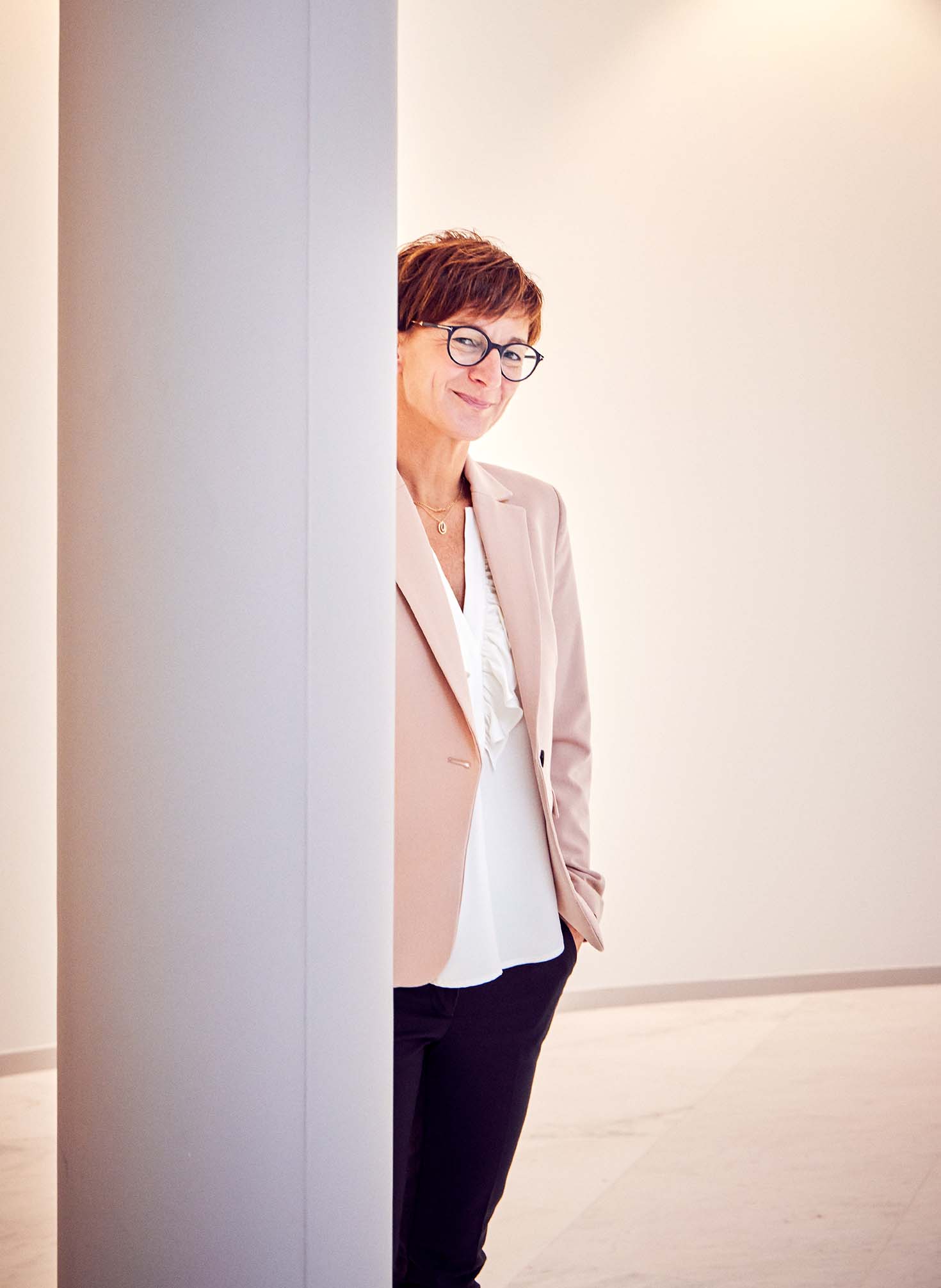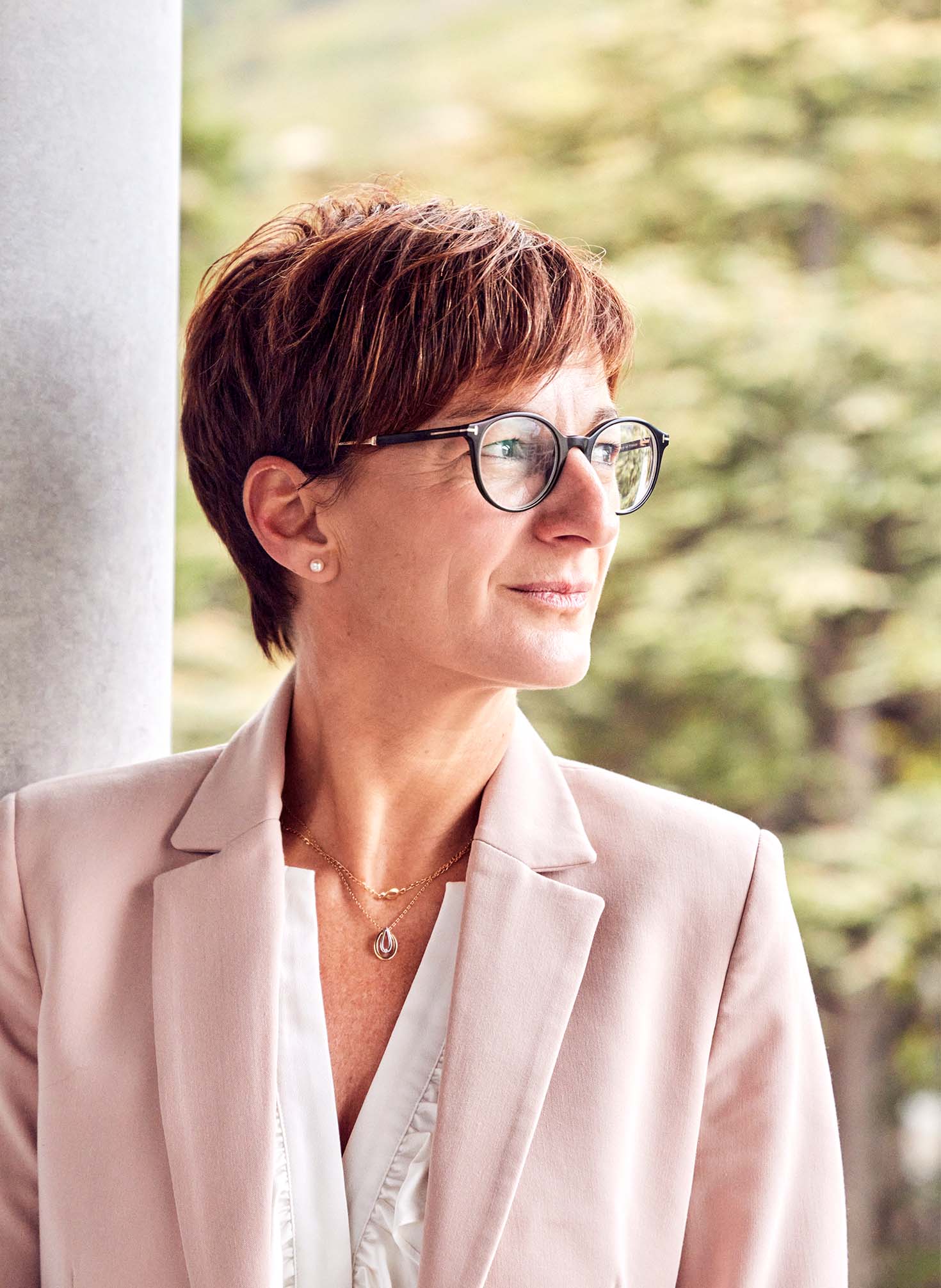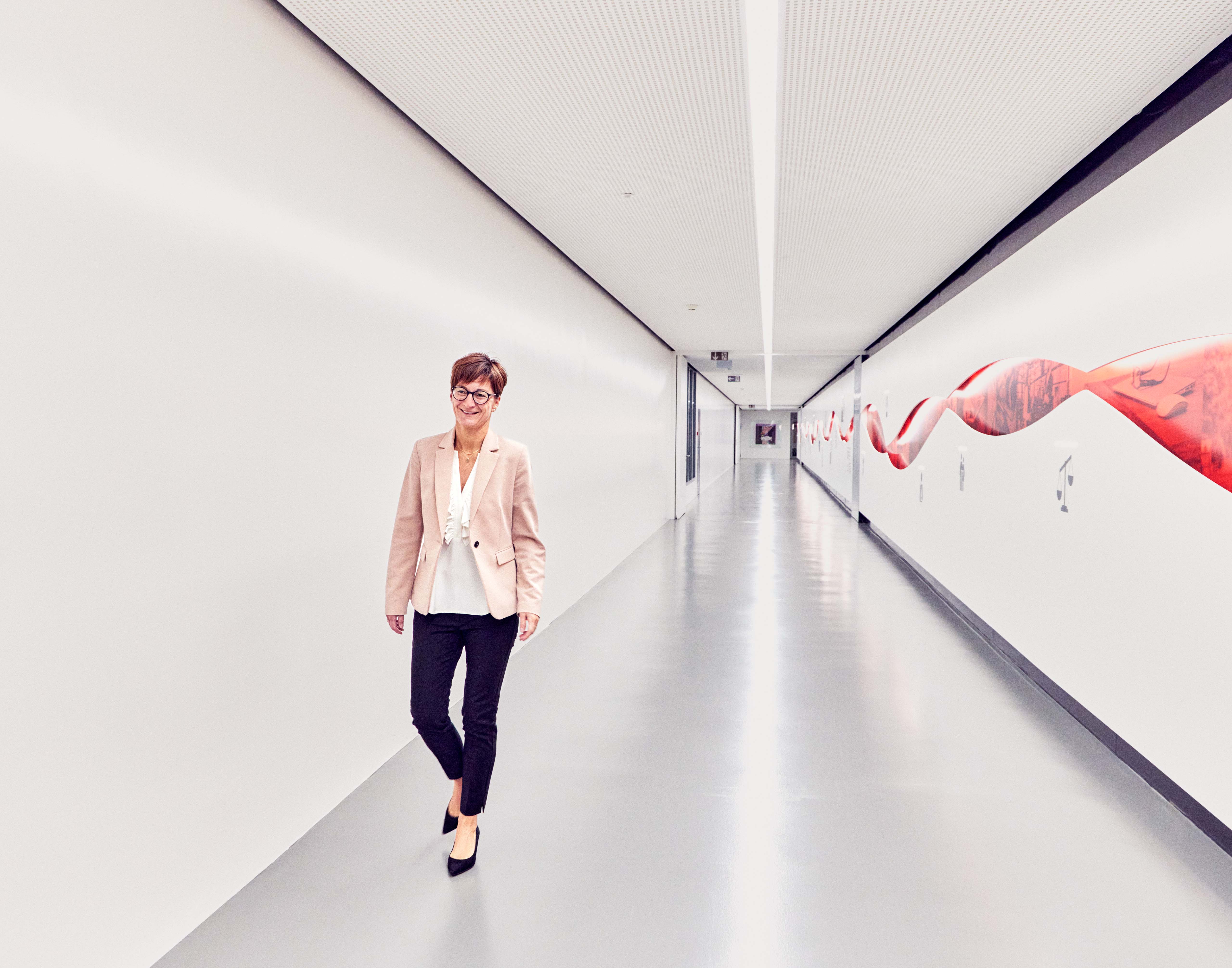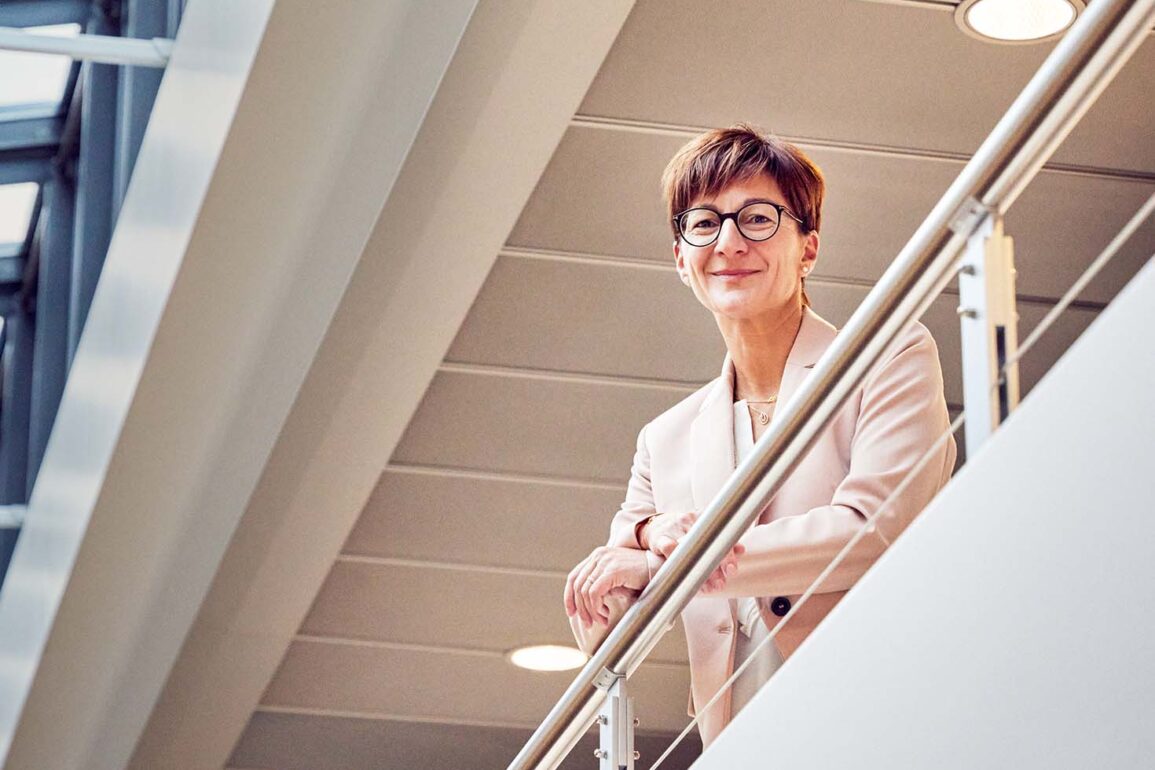Karin Perraudin is President of the Board of Directors of Groupe Mutuel Holding and President of the Board of Trustees of the Groupe Mutuel Foundation. The charitable foundation owns the holding. Karin Perraudin explains why this is the right legal form for the insurer and what influences her own social commitment.
Insurer Groupe Mutuel belongs to a charitable foundation. How did that come about?
In 2017, we considered giving the group a new legal structure. At the time, we were organised as an association. However, we wanted to improve our governance and a pyramidal structure with the Groupe Mutuel Foundation at the top gave us a more streamlined and clear structure. The foundation owns the holding, to which the various companies within the group belong, including basic and private insurers, service companies and asset management firms.
Why did you opt for this structure?
We wanted to increase transparency, we wanted a structure that is easy to communicate and we wanted a legal form that operates on a non-profit basis, without private shareholders. We do not pay dividends; instead, we invest in the quality of the services we provide to our policyholders.
Why was that important?
We are an important actor within the Swiss healthcare system. Health insurance is a sensitive topic; with the compulsory basic insurance, we fulfil a governmental mandate. As such, we wanted the company to belong to the policyholders. And we wanted Groupe Mutuel to assume its social responsibilities, which is why we felt it was important to ensure that part of the annual results go into social projects related to health and healthcare.
Was there an alternative?
One option would have been to form a cooperative association. But with 1.3 million policyholders, we felt this form was too complex. A foundation is a simpler form; it’s more dynamic and allows for speedier decisions.
Foundations have a set purpose. Were you not concerned…
… that this might hinder our development? No. The foundation owns the holding, and its purpose is to support healthcare, research and prevention. The holding, on the other hand, has a broader set of objectives that enable us to implement our strategy, invest in new businesses and expand our offer through corporate takeovers.

Karin Perraudin is resident of the Board of Directors of Groupe Mutuel Holding and President of the Board of Trustees of the Groupe Mutuel Foundation. She was President of the Board of Directors of Banque Cantonale du Valais and Clinique de Valère. She is a member of the management boards of Fenaco and Geneva Airport, and served as a member of the Valais cantonal parliament from 2001 to 2009.
How does the holding support the foundation financially?
One aspect we need to bear in mind is the fact that basic health insurance is a key business area within our group. This area is subject to the Federal Health Insurance Act, meaning we are not permitted to make a profit; any profits go into basic insurance reserves. However, we are able to make a profit in other insurance branches. We invest these funds into improving our customer services and expanding our digital offer. Some of these profits go to the foundation, usually CHF 1 million to CHF 2 million a year.
What does the foundation do with these funds?
The foundation’s activities can be divided into three areas. First, it supports individual policyholders who are experiencing difficult personal circumstances due to health problems. For example, we recently supported a child who needed a new pair of glasses every year as a result of an accident; basic insurance only covers a fraction of these costs. Second, we promote charitable organisations that are active in the field of health and healthcare. We support social sports projects for children and youths as a partner of the Laureus Foundation Switzerland.
And the third area?
We support research that strengthens and improves the Swiss healthcare system.
Could you give us an example?
We are currently supporting a project that is researching a system for financing treatments that depends more on the quality of the care than the quantity. In this manner, independent experts identify ways to improve our healthcare system.
How does the foundation select projects?
Today, we receive requests without any communication on our part. As a first step, we analyse whether these requests meet the purpose of the foundation and assess the projects. We then submit a pre-selection to the Board of Trustees, which makes the final decision. We support about 80% of requests that meet the purpose of the foundation.
You mentioned that you support individual policyholders. Does the fact that this is necessary mean that our healthcare system is failing, or is it a sign of strength that other options are available for these cases?
In my view, it is clearly the latter. We have a strong, high-quality healthcare system. Our basic insurance covers many forms of treatment, especially essential ones. The requests we receive for individual support are all isolated cases. These can be extremely complex cases and unique situations combined with a financially difficult family situation. But these are all rare cases, which show that our system works. And for those exceptional cases, organisations like ours are here to complement the system.

«It shows that the system works»
Karin Perraudin
Will foundations play an increasingly important role?
Personally, I believe that foundations that are committed to social concerns will gain in importance. We have strong government support, but that is not always enough. In addition, problems such as domestic violence are addressed more openly today. People in these difficult situations turn to foundations, which provide an indispensable service to society.
What is your view on cooperation in social projects? After all, you have experience in politics, the private sector and the foundation community.
Switzerland’s strength is the fact that different actors work together. The government, the private sector and organisations such as foundations have many skills that complement one another. It’s a good collaboration that we can foster further for the good of society as a whole. The government guarantees a basis. To fulfil its mission, it often uses the legal form of a foundation for subsidies: while foundations are monitored, they also benefit from a certain degree of independence. And finally, we have the private sector, which plays a role when it comes to integration and rehabilitation.
What are the benefits of the private sector?
It’s powerful, as we can see when we look at health insurers. We have a liberal system in which competition is strong and profitable. But the entire system is also strictly regulated. The benefit of the private sector is the fact that it always aims to keep operating costs at a minimum. Combining the various forms and actors benefits the system as a whole.
Where do you find the time for your volunteer work in addition to your professional duties?
I have been very lucky and have achieved a lot thanks to my roles and responsibilities. To me, giving back some of my time seemed to make sense. It gives me tremendous satisfaction. In my job, issues tend to focus on profitability and returns; when it comes to my volunteer work, other things matter, which creates a nice balance.
You also had to deal with a cruel blow in your personal life.
Talking about it is easier today: I lost my daughter 10 years ago. But you are right to address this experience. It did change a lot of things in my life, including some of my priorities. The experience strengthened the values I stand for today. When we live through tragic moments, we tend to find out which things are important and which are less so. The people we surround ourselves with are important, as are the values that remain. We start to think about a lot of things in relative terms when we have been through something like that. And it gave me additional motivation for some of my volunteer work, in particular my work for les Pinceaux magiques. This charitable organisation brings joy to children in hospital by encouraging them to paint.
Why did you choose this organisation?
Many parents start a foundation in memory of their child. I chose a different path: I wanted to donate my time to an organisation that looks after children in hospital. My daughter was in hospital for many months, and I saw first-hand just how indispensable the activities of this organisation, and others, are for the children and their parents.
Had you heard of les Pinceaux magiques before?
No, I encountered it when my daughter was in hospital. I could see how happy the children were when the entertainers came to the hospital to paint; painting made the children laugh again. But above all an occupied child means that parents can take a break. In hospital, parents spend hours just watching their child breathe. Having even just 15 minutes to get a coffee is tremendous and gives them space to breathe themselves.
What helped you in that situation?
I was lucky enough to have an extremely supportive family, and my closest friends were there for me as well, which was a great help. And in turn, an experience like that helps you appreciate the value of these friendships and cultivate them.
Did you receive support from any organisations?
I was fortunate: there were a lot of organisations that would have supported me. Thanks to my family and friends, I did not need them, but the organisations were always there. They approached us and offered their help. There were people around us who depended on that support, and that showed me just how important these organisations are. Some people quickly find themselves in a complicated or even dramatic situation when their child is taken ill or has to go to hospital. They need their employer to accommodate their situation, for example. People who are on their own need a lot of help; that’s what these organisations are there for.

Karin Perraudin: “The most important thing is the environment, the people, the values that we hold dear.”
And that’s not your only social commitment: you are also President of the Board of Trustees of Fondation Fovahm.
The foundation takes in adults with mental disabilities, accompanies them and provides vocational training. Its mission is to create an adapted living environment and to promote social and occupational integration for this group of people.
Has the pandemic made this work harder?
Yes, definitely. The pandemic demands flexibility and agility from us all; for people with disabilities, that can be complicated. When someone tells them they are not able to work for an indefinite period of time and have to stay at home, they need time to adapt to that. And there are also health issues.
Meaning?
Depending on the disability, it may not be possible to vaccinate some people.
How did employers react?
During the pandemic, most companies maintained their integration plans. Employers today are aware of their responsibility to society. We have noticed an increase in companies that have created jobs for people with disabilities. Today, social responsibility is closely connected to sustainability.
Does it help to have business representatives like yourself on foundation boards, people who are aware of the needs of the private sector and the opportunities it has to offer?
It is important to have a diverse range of skills, experiences and sensitivities on any foundation or management board. Foundation board members with a background in business can use their networks to find companies that want to participate in these integration projects. They can also help make the foundation known and generate funds. And last but not least, they have professional management expertise, which helps professionalise these foundations and organisations.
Today, sustainability has become a sales argument. Do Groupe Mutuel policyholders feel it is important that the company belongs to a foundation?
The fact that we give back part of our profits to social commitments surely contributes to our positive image. But there are other reasons why policyholders come to us or want to stay with us. What counts are the premiums, the quality of our customer service, the quality of our overall services and our human touch.
And the employees? Is the foundation a reason to be proud of their employer?
Yes, I believe it is. The values of being helpful, proactive and responsible are part of our corporate culture, which is why it is important that the foundation conveys these values in its activities, particularly through charity to others.


